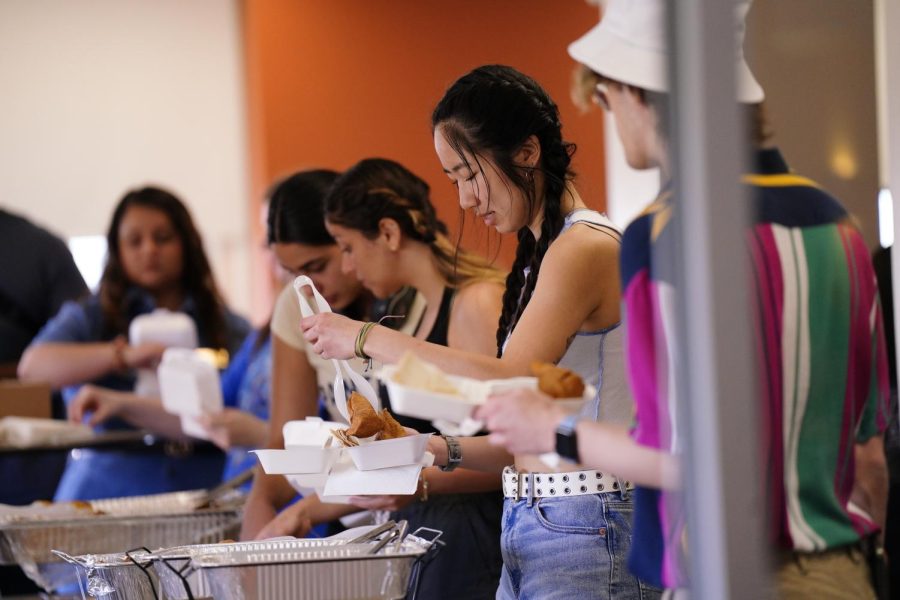‘Oh We Belong’ end-of-year celebration fosters inclusivity, shared spaces
Jonathan Guo | Staff Photographer
A student takes food during the “Oh We Belong End of Year Celebration” put on by Pitt’s Office of Inclusion and Belonging at the William Pitt Union on Friday.
April 17, 2023
For Sherdina Harper, the assistant director of the Office of Inclusion and Belonging, the office is a “home away from home,” as well as a space for students to come together and feel empowered by their differences.
“We can create this sanctuary where we can learn from one another, encourage one another, and empower one another’s ideas even if they’re different,” Harper said.
OIB hosted its first annual “Oh We Belong” event on Friday afternoon. Students from diverse student organizations and communities, such as the Asian Student Alliance and Black Action Society, gathered on the sixth floor of the William Pitt Union to enjoy international cuisine, music and raffle prizes.
OIB aims to provide equity to historically marginalized groups including Black, indigenous, Asian American and Pacific Islander, Latinx, international and LGBTQ+ students. Its mission is to create a sense of belonging and acceptance among the student body.
Emiola Oriola, OIB’s director, said the organization experienced its first full year of operation this school year following changes in student needs.
“We saw [the need] not just to get cross-cultural engagement with other organizations and communities, we saw the need for a sense of belonging,” Oriola said. “This year, we tried to integrate unique and innovative events that didn’t just help people meet each other, but help create that sense of belonging and inclusivity with each other.”
Oriola added that feeling a sense of belonging can differ depending on a student’s background and identity.
“Nobody gets housesick. They get homesick. In college, no matter where you’re from, you long for that place where you feel like you belong. While Pitt may not be able to provide everything that makes them feel at home but do our best to provide key features,” Oriola said. “For some, it’s the smell of their cultural food, for others it’s the honoring of [holidays].”
Sydney Smith, a junior computational social science major, attended the event. Smith is a Global Ties mentor, which is an organization that works alongside the OIB to assist international students in their transition to college in the U.S.
Smith said she joined the Global Ties program because of her interest in diverse cultures.
“I’ve always been interested in international relations and global relations,” Smith said. “I love to meet other people from different cultures and Pitt is such a global community. There are people from so many places that are here, and college is such a unique place to broaden your mindset.”
Hana Cha, a sophomore nursing major, described the sixth floor of the William Pitt Union as a shared space where she gains exposure to other cultures and meets new people.
“It’s a joint space, where students are able to not only learn about their own culture but also see all different types of cultures with different events,” Cha said. “We can meet new people from all different types of cultures [on this floor] too.”
Cha and other members of the ASA, which also has its office on the sixth floor of the Union, enjoyed samosas and played trivia during the event.
Harmony Arungwa, a junior English writing major, also attended the event. Arungwa is the social action co-chair of BAS, which also has its office on the sixth floor.
Arungwa said creating belonging on campus involves including diverse forms of identity, including multiculturalism.
“I think I understand the need to change and to bring belonging,” Arungwa said. “It includes incorporating multicultural visibility with different forms of identity.”
Arungwa said spaces like the OIB are important for Black students to feel a sense of community on campus.
“Black students [make up a small portion] of the population, and [Pitt] is a majority white school too, so I think it’s really important to have spaces like this so we can all congregate because I think it fosters community and makes sure people don’t feel isolated on campus,” Arungwa said. “It gives people the space to just feel like they can be themselves without having to conform in white spaces.”



